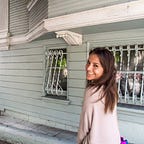Can The Selfie Generation Save Us? From Larry Nassar to Parkland, The Answer is Yes.
— Julia LaSalvia
As a proud member of The Selfie Generation, I find myself in constant opposition with people who claim that we’re entitled. There’s the popular narrative that we were given too many participation trophies (okay, fine, I have a few), were coddled by our parents, that the Internet made us lazy and narcissistic, and that we’re doomed for a life of disappointment as we enter the workforce and realize we’re not as “special” as our parents, teachers, coaches, and Instagram followers led us to believe.
Yes, we take selfies, post think pieces, and tweet our feelings, but is it much different than what our grandparents did when they carved their initials into the cement driveway? Technology has changed the scope, but it’s all the same natural, human impulse: we want to be visible. Is it self-centered or self-empowered? Is there even a difference? And, isn’t there something powerful about people, specifically young women, finding their voice and feeling worthy enough to use it?
As I watched the students in Parkland, Florida turn their mourning into activism, and reflected on the brave, young women who so eloquently shared their stories at the Larry Nassar hearing, I came to a realization: maybe we are more entitled than our predecessors.
This generation’s “entitlement problem” has made us believe that our stories are deserving of being shared. That we are justified in wanting a more equitable, safer world than what’s been passed down to us. That young people, especially young women and people of color, should be heard. And that sharing experiences and exchanging in dialogue can bring about real change.
Devastatingly, we were reminded last week that the issues we’re facing have life and death consequences. There have been eight school shootings since the start of 2018. One in five women will get sexually assaulted while they’re in college, and 146 people have been shot and killed by police this year. There are a lot of people who would have us believe that these issues are too complicated to fix, that “boys will be boys,” or you can’t stop a mentally unhinged person, or this is just the price you pay to live in a free country. That terrible episodes like this are just part of the natural order of things. That we should give our thoughts and prayers and go home, leaving those affected to pick up the remaining fragments of their shattered lives, becoming unfortunate casualties of the “cost of freedom.”
17-year-old Parkland survivor Emma Gonzalez said it best: “we call BS.” We can’t keep “moving on” from these tragedies and acting like they’re normal. This is not normal.
Bobby Kennedy’s speech on the mindless menace of violence, that he made just months before his own life was taken by gun violence in 1968, is as salient now as it was then:
“Whenever any American’s life is taken by another American unnecessarily — whether it is done in the name of the law or in the defiance of law, by one man or a gang, in cold blood or in passion, in an attack of violence or in response to violence — whenever we tear at the fabric of life which another man has painfully and clumsily woven for himself and his children, the whole nation is degraded.”
The students in Parkland, Florida are saying enough. They are demanding that we stop continuing the normal cycle of grieving and then returning to life as usual. Mass shootings and gun violence have become routine.This isn’t normal. This is avoidable. And we need to call it out for what it is — BS.
Last week an entire school lost its innocence. An entire community was forced to face a tragedy so horrific that no life stage could ever possibly equip you for it, but the fact it occurred at a school, a place where you’re supposed to feel the safest, at a time in life where you shouldn’t be dealing with death, much less murder at this scale, is so disturbing that it is beyond comprehension.
The same goes with the Larry Nassar case. A doctor violated hundreds of young girls repeatedly. So many adults, including victims’ own parents, school administrators, and the US Olympic Committee didn’t believe or flat-out ignored their claims. Now these young women have come together to create an indestructible force. Stories that were once in the shadows are being brought into the forefront of our consciousness, transforming victims into an army of survivors. As Kyle Stephens, who was first abused by Nasser at the age of six, said in her victim impact statement:
“Little girls don’t stay little forever. They grow into strong women that destroy your world.”
Young people, specifically young women and people of color, are looking at the world around them and calling BS. They are leading movements, sharing their experiences, and demanding accountability. You can call it entitled, call it whatever you want, but they are taking matters into their own hands now. Who’s ready to listen to them?
